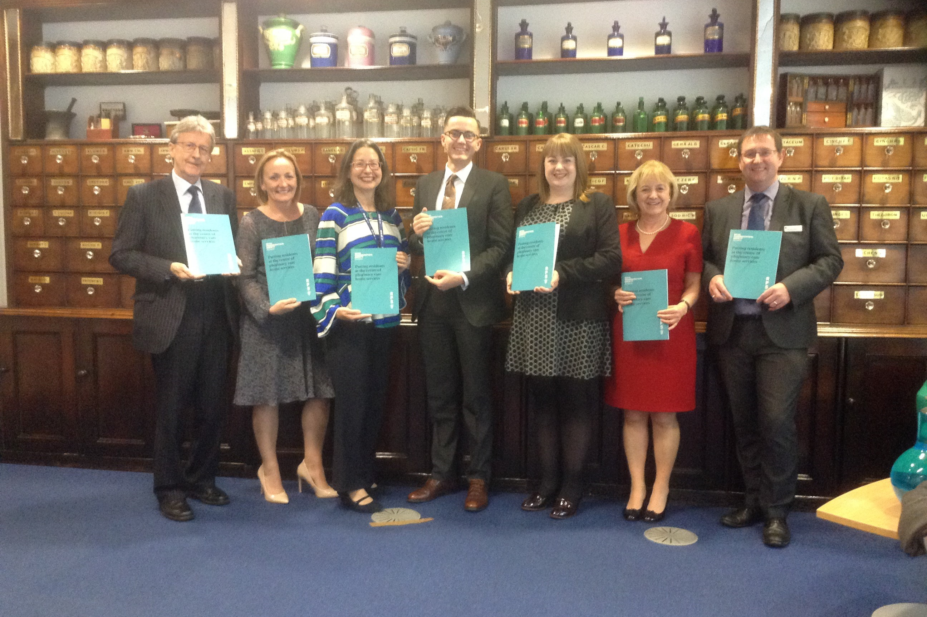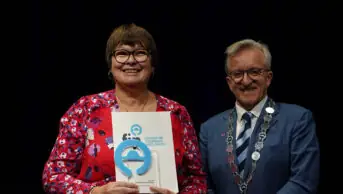
Corrinne Burns
The Royal Pharmaceutical Society (RPS) Scottish Pharmacy Board (SPB) held its latest meeting at the Society’s Edinburgh offices on 24 April 2019. Present at the meeting were Paul Bennett and Ash Soni, chief executive and president of the RPS, respectively, and Robbie Turner, the Society’s director of pharmacy and member experience. Apologies were received from board member Ailsa Power.
After welcoming attendees, board chair John McAnaw noted that this would be Johnathan Laird’s last meeting as a board member. McAnaw thanked Laird for his “input and support” throughout his three-year term, and also for co-editing the online Scottish pharmacy magazine
Pharmacy in Practice
.
Chief executive’s update
Meanwhile, Bennett told the meeting that the most recent RPS annual general meeting had heard two motions put forward from a member. Although neither motion was carried (one was withdrawn), Bennett said that their “spirit was understood”, and that the outcome of the discussions that followed would be considered by the Assembly.
Bennett added that it is important for a member-centric organisation to allow members to “raise concerns and put forward motions”.
Ahead of the national pharmacy board elections, Bennett spoke of the importance of “behaving professionally in all channels, but especially on social media”, and said that the 2018 election campaigning had seen examples of where social media behaviour had not been well conducted.
Bennett published fresh guidance on social media use in February 2019 and he said that while he was “optimistic that this year’s tone and mood will be better than it was last year, we will look at it closely”.
Business plan
Alex MacKinnon, director for RPS Scotland, used the meeting to launch RPS Scotland’s updated care home policy, ‘Putting residents at the centre of pharmacy care home services’.
While some issues identified in the 2013 Wilson and Barber
Review
of NHS Pharmaceutical Care of Patients in the Community in Scotland
have been addressed, MacKinnon explained that there is still no national approach. The new policy contains “several key asks” that will challenge the government and political parties and, as such, is not just a policy but “a call to action”, MacKinnon said.
The report was presented at a parliamentary event to be held the evening of the board meeting.
RPS Scotland had also, MacKinnon said, engaged with a number of cross-party groups and parliamentary events over the past quarter: in particular, the Society was called to give evidence to the Committee of the Scottish Parliament on new drug driving proposals. The legislation was passed in Parliament on 27 February 2019.
He went on to provide an update on the Scottish Primary Care Clinical Professions Collaborative Group, which works to lobby government on the major issues in primary care. The group held a conference in January on ‘The future of primary care in Scotland: multidisciplinary collaboration, digital infrastructure and workforce challenges’, which MacKinnon attended.
The British Medical Association has now joined the collaborative, meaning that “all 17 allied health professions and contractors are working together with common purpose”, MacKinnon said.
Pharmacy sale of cannabidiol oil
Aileen Bryson, deputy director and practice and policy lead at RPS Scotland, asked the SPB if there was a need for the Society to provide a policy statement on the sale on cannabidiol (CBD) oil in pharmacies. Although these products should be sold as food supplements, with no claims for medical qualities, some advertisements were “sailing quite close to the wind”, she said.
Soni added that it was important that the Society has a position on their sale. “If we don’t have anything, it feels like we’re abrogating responsibility. People need information to help them make the right decisions.”
Jonathan Burton, vice chair of the board, said that the Society shouldn’t “lose sight of the wider issue: there are a lot of unlicensed health food supplements on the market”.
“I’d like to see a core set of principles about how you deal with products in this category.”
Board member Andrew Carruthers said that UK Medicines Information had already produced guidance, and that a policy statement should be easy: “There’s no evidence for its use. Much higher doses are needed for epilepsy than are in these bottles”.
McAnaw said that he got the sense that the board would suggest a factsheet based around practice rather than science, as the latter was covered in a Quick Reference Guide produced by the RPS Science team in March 2019.
Turner responded, saying he would take the board’s views back to the RPS support team.
Pharmacy degree apprenticeship
Later in the meeting, Gail Fleming, director for education and professional development at the RPS, said that the Society had written to the Institute for Apprenticeships and Technical Education (IATE) expressing the sector’s concern over lack of communication around proposals for a pharmacy degree apprenticeship.
She told the meeting how the Society had met with the IATE on the morning of the board meeting to put members’ concerns to them.
Fleming and Bennett were also due to meet the chair of the pharmacy trailblazer group — made up of employers who wish to see a pharmacy apprenticeship created and to be involved in developing the standards — the day after the board meeting. The following week, the RPS was due to attend a stakeholder meeting led by the IATE to discuss the proposals.
At this stage, Fleming said, the group was “considering whether there is an appetite for an apprenticeship”, in which apprentices would complete an MPharm degree and their preregistration training over five years, while being employed by a pharmacy.
Fleming said that it was difficult to have a view at this early stage, as there are “so many unknowns” but added that the “right balance of study and learning in many sectors could be attractive. Annamarie McGregor, practice development lead at RPS Scotland, said that it “could be an access route for people from deprived areas, who are put off by the cost of tertiary education”.
Parliamentary launch of care homes policy
On the evening of the board meeting, RPS Scotland staff, and board members John McAnaw, Kathleen Cowle, Tamara Cairney and Andrew Carruthers met with MSPs at Holyrood to share the key asks from the Putting residents at the centre of pharmacy care home services. Speaking at the event, Alex MacKinnon said that “care homes have not been prioritised, or indeed treated, as specialist areas in the way that they should”. The event was attended by Rose Marie Parr, chief pharmaceutical officer in Scotland, who said it was “really important” that pharmacy undergraduates “have training to get [care home] experience”.
- The next meeting of the Scottish Pharmacy Board will be held from 2—3 July 2019


